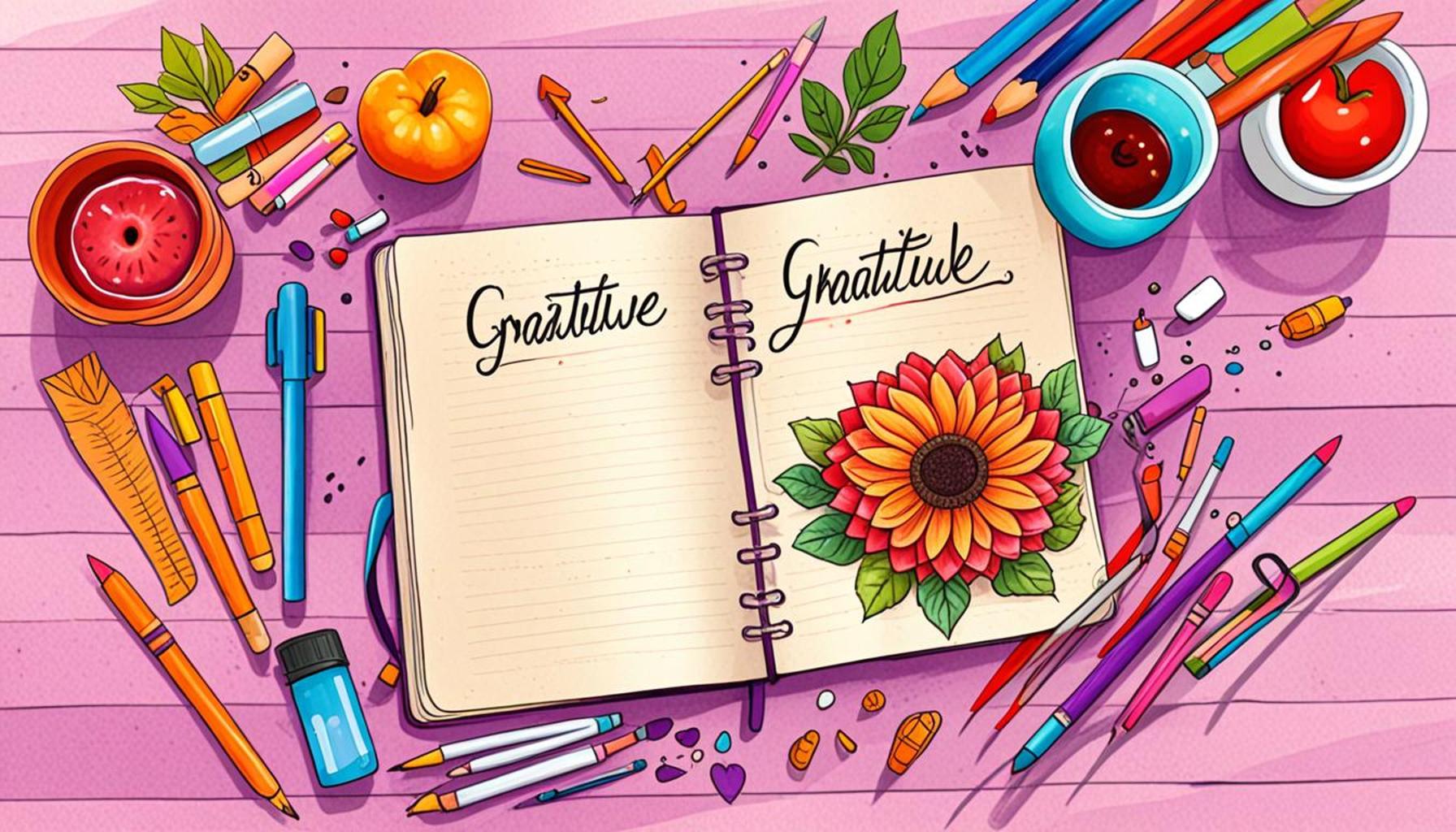Gratitude as a Tool for Resilience in Difficult Times

The Strength of Gratitude in Difficult Times
During challenging periods, people often seek out sources of strength and comfort. Surprisingly, one of the most effective mechanisms to bolster resilience is the practice of gratitude. Embracing gratitude not only helps individuals navigate through personal hardships but also fosters a sense of community in times of need. Recognizing what one appreciates, no matter how small, can lay a foundation for maintaining an optimistic outlook even when circumstances seem bleak.
The impact of gratitude on mental health and overall well-being is profound and multifaceted. For instance:
- Increases optimism: Individuals who take the time to recognize positive aspects of their lives are more likely to develop a hopeful perspective. This mindset can significantly enhance motivation and the determination to face challenges.
- Strengthens social connections: Expressing gratitude creates bonds with others, reinforcing relationships. In communities where social ties are crucial, such as in Nigeria, these connections can provide vital support networks.
- Boosts mental health: Numerous studies indicate that practicing gratitude is linked to reduced symptoms of depression and anxiety. For many, the act of acknowledging what they are thankful for can be a powerful therapeutic exercise.
In Nigeria, where economic obstacles and societal pressures loom large, the advantages of gratitude become increasingly significant. The traditional value of community support is entrenched in Nigerian culture; hence, gratitude helps connect individuals with their networks in meaningful ways. Celebrating shared resilience fosters unity, especially in challenging times.
Engaging in gratitude transforms not only personal experiences but also communal dynamics. In difficult moments, focusing on what one appreciates can shift perspectives and lift spirits. Here are a few areas where gratitude can make an impact:
- Health and family: Acknowledging the presence and support of loved ones can provide immense comfort. In a society where family ties are often closely knit, recognizing this support can fortify one’s emotional strength.
- Small victories: Celebrating tiny achievements, such as completing daily tasks or overcoming minor obstacles, can create a sense of progression. This recognition encourages individuals to continue striving forward.
- Support systems: Expressing gratitude for friends, organizations, and community members providing assistance can significantly strengthen interpersonal bonds. It highlights the importance of collaboration and mutual support.
This discussion will delve deeper into how gratitude serves as a powerful tool for resilience. By highlighting strategies to cultivate gratitude in daily life, readers will uncover practical insights that have the potential to uplift and inspire, particularly during trying times. As we explore these strategies, we will discover how a simple shift in focus can lead to profound changes in personal outlook and community cohesion.
YOU MAY ALSO LIKE: Read read another article
Harnessing Gratitude for Personal Growth
When faced with adversity, cultivating a sense of gratitude can significantly alter one’s approach to life’s challenges. This shift in perspective towards an appreciation for what one has, as opposed to what one lacks, can enhance resilience. Particularly in the Nigerian context, where many grapple with economic uncertainties, political instability, and social pressures, the adoption of gratitude practices can serve as a bedrock for emotional fortitude.
Understanding how to integrate thanksgiving in daily life is crucial, especially when nurturing resilience during tough times. Here are some strategies individuals can implement:
- Gratitude Journaling: Taking a few minutes daily to write down three to five things that one is thankful for can shift thoughts from negativity to positivity. This simple act can foster a sense of accomplishment and reflection, leading to improved mental well-being.
- Gratitude Letters: Writing letters to express appreciation to friends, family, or mentors can reinforce existing relationships. In Nigeria, where interpersonal connections hold significant value, such gestures can deepen bonds and provide a sense of belonging.
- Verbal Acknowledgment: Regularly expressing appreciation verbally, whether it’s a simple “thank you” or a more elaborate statement of gratitude, contributes to a more positive environment. This practice can help in building a spirit of generosity and support among family and friends.
Moreover, the act of recognizing what one is grateful for can magnify feelings of contentment and happiness. Research has shown that people who practice gratitude experience greater emotional regulation, leading to increased resilience in the face of hardships. In a vibrant culture like Nigeria’s, sharing stories of gratitude within communities can encourage others to adopt these practices, fostering a shared sense of hope and optimism.
Further, embracing gratitude encourages individuals to focus on small aspects of life that often go unnoticed. Whether it’s the foods shared with family during spirited gatherings or the compassionate support of community members during hard times, these elements can pivot one’s mindset from a scarcity mentality to one steeped in abundance. Such transformations can be immensely powerful, fostering a resilience that is not only personal but communal.
As we delve deeper into how gratitude acts as an essential tool, we will explore the relationship between the practice of gratitude and community resilience. Nigerian society, renowned for its communal values, benefits immensely when individuals actively engage in gratitude, creating ripple effects that strengthen social ties and collective empowerment. Gratitude, therefore, is not merely an individual exercise—it holds profound implications for the fabric of society itself.
Understanding the Depth of Gratitude
Gratitude is much more than simply saying “thank you.” It is a profound acknowledgment and appreciation of the positive aspects of life, even amidst challenges. Research indicates that practicing gratitude helps foster a positive mindset, enhancing emotional well-being and resilience, particularly during difficult times. Emphasizing gratitude can shift our focus from what we lack to what we have, creating a buffer against negativity.
The Science Behind Gratitude and Resilience
Studies have shown that individuals who regularly practice gratitude experience lower levels of stress, increased feelings of happiness, and improved mental health outcomes. By documenting moments of gratitude or engaging in daily reflection, people can rewire their brains to recognize positivity. This cognitive shift not only aids in coping with life’s pressures but also strengthens relationships, providing essential support during tough moments.
| Category 1 | Category 2 |
|---|---|
| Emotional Resilience | Gratitude enhances emotional strength, allowing individuals to recover more easily from setbacks. |
| Physical Health | Grateful individuals often report fewer physical ailments, leading to improved well-being and longevity. |
Incorporating Gratitude into Daily Life
Incorporating gratitude practices into your daily routine is simple yet impactful. Consider keeping a gratitude journal, where you can document at least three things you are thankful for each day. This practice can cultivate a positive outlook and serve as a powerful tool for resilience, helping you navigate the stormy seas of life more effectively. Whether through meditation, mindful reflection, or community sharing, finding avenues to express gratitude can lead to profound changes in your mental landscape.
YOU MAY ALSO LIKE: Read read another article
Community Empowerment Through Gratitude
The impact of gratitude extends beyond the individual, influencing the very communities in which they reside. In Nigeria, where communal living and support systems are integral, the practice of gratitude can catalyze collective resilience. When individuals express gratitude, they not only uplift their own spirits but also inspire those around them to adopt a similar mindset. This ripple effect can lead to empowered communities that thrive together, even in the face of adversity.
One of the profound aspects of gratitude is its ability to enhance social connections. Strong interpersonal relationships are a cornerstone of Nigerian culture, often providing a vital support network during challenging periods. As individuals share their feelings of appreciation, whether through verbal expressions, social media posts, or community gatherings, they contribute to a culture of positivity and mutual support. The sentiment shared can lead to stronger bonds among families, friends, and neighbors, creating a safety net that boosts resilience.
Moreover, the role of traditional practices in promoting gratitude within Nigerian communities cannot be overlooked. Various cultures across the nation engage in rituals that involve expressions of thankfulness, be it during festivals or simple communal gatherings. These traditions reinforce the importance of acknowledging blessings, creating a sense of unity and shared purpose. For instance, during holidays like Eid-el-Fitr or Christmas, communal meals and celebrations often include moments of thanksgiving, fostering togetherness and collective strength.
Research has illustrated that communities that actively practice gratitude exhibit stronger resilience during crises. A case study highlighted the way neighborhoods in Lagos came together following natural disasters, with residents displaying gratitude for the kindness and support received from each other. Such shared experiences not only bolster emotional strength but also promote collaboration in addressing communal challenges, be it crime prevention or facilitating local enterprises.
Furthermore, schools and educational institutions in Nigeria have begun to recognize the significance of gratitude in fostering resilience among students. Programs that incorporate acts of gratitude into curricula aim to teach students the importance of appreciation—from thanking teachers to acknowledging peers’ efforts. This not only nurtures character development but also equips future generations with a crucial tool for navigating life’s inevitable obstacles.
The conversation around gratitude as a tool for resilience must also address the challenges that inhibit its practice. Many individuals may feel overwhelmed by their circumstances, struggling to find aspects of life to appreciate amidst the trials they face. However, community leaders and mental health advocates can play pivotal roles in affirming the importance of gratitude. Workshops and community dialogue platforms can assist in encouraging members to adopt gratitude practices, allowing them to identify and celebrate small victories even in tough times.
In embracing gratitude, individuals and communities alike can cultivate a transformative resilience that empowers them to face adversity with confidence and solidarity. The collective acknowledgment of what is good and generous within the community serves to fortify connections, thereby creating a nest of support that is indispensable during difficult periods. As gratitude flourishes, so does a deeper sense of belonging, nurturing a culture where endurance is born out of appreciation and interconnectedness.
ADDITIONAL INSIGHTS: Expand your understanding here
Embracing Gratitude for Collective Resilience
In conclusion, gratitude as a tool for resilience offers a powerful antidote to the challenges faced during difficult times. The communal bonds fostered through expressions of appreciation not only uplift individual spirits but also create a robust support network vital for navigating life’s adversities. In Nigerian society, where community is paramount, practicing gratitude strengthens the social fabric, enabling neighborhoods to draw from shared experiences and foster collective empowerment.
This profound connection can transform the way communities respond to crises, as evidenced by the collaborative spirit that arises during times of need. The ability to acknowledge and express thanks, even in the face of hardship, cultivates an environment rich in positivity and unity. As families and friends come together to support one another through verbal affirmations and traditional practices, they build a resilient culture that thrives on mutual support and understanding.
However, recognizing the barriers to cultivating gratitude is equally important. Addressing feelings of overwhelm requires proactive measures from community leaders and mental health advocates to create platforms that encourage gratitude practices. Through workshops and educational programs, communities can remind individuals to celebrate small victories, fostering an enduring sense of hope.
Ultimately, as gratitude becomes a core value among individuals and communities alike, it lays a foundation for resilience that transcends individual struggles. It nurtures a sense of belonging and togetherness, turning gratitude into a shared philosophy that empowers everyone to endure and overcome even the toughest of times. As we reflect on the transformative power of gratitude, let us commit to embracing this tool, not only for our own resilience but for the collective strength of our communities.


